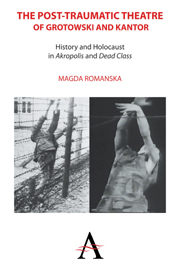 The Post-traumatic Theatre of Grotowski and Kantor
The Post-traumatic Theatre of Grotowski and Kantor Book contents
- Frontmatter
- Contents
- Foreword by Kathleen Cioffi
- Preface
- Acknowledgments
- List of Illustrations
- Introduction
- Part I Our Auschwitz: Grotowski's Akropolis
- Chapter 1 Jerzy Grotowski: A Very Short Introduction
- Chapter 2 Native Son: Grotowski in Poland
- Chapter 3 Grotowski: The Polish Context
- Chapter 4 Grotowski, the Messiah: Coming to America
- Chapter 5 The Making of an Aura
- Chapter 6 On Not Knowing Polish
- Chapter 7 “In Poland: That is to Say, Nowhere”
- Chapter 8 Akropolis/Necropolis
- Chapter 9 The Vision and the Symbol
- Chapter 10 “This Drama as Drama Cannot Be Staged”
- Chapter 11 Two National Sacrums
- Chapter 12 “Hollow Sneering Laughter”: Mourning the Columbuses
- Chapter 13 Against Heroics
- Chapter 14 Representing the Unrepresentable
- Chapter 15 Trip to the Museum
- Chapter 16 Bearing the Unbearable
- Chapter 17 The Living and the Dead
- Chapter 18 Jacob's Burden
- Chapter 19 The Final Descent
- Chapter 20 Textual Transpositions
- Chapter 21 Akropolis After Grotowski
- Part II Our Memory: Kantor's Dead Class
- Postscript
- Appendix
- Notes
- Bibliography
- Index
Chapter 4 - Grotowski, the Messiah: Coming to America
from Part I - Our Auschwitz: Grotowski's Akropolis
- Frontmatter
- Contents
- Foreword by Kathleen Cioffi
- Preface
- Acknowledgments
- List of Illustrations
- Introduction
- Part I Our Auschwitz: Grotowski's Akropolis
- Chapter 1 Jerzy Grotowski: A Very Short Introduction
- Chapter 2 Native Son: Grotowski in Poland
- Chapter 3 Grotowski: The Polish Context
- Chapter 4 Grotowski, the Messiah: Coming to America
- Chapter 5 The Making of an Aura
- Chapter 6 On Not Knowing Polish
- Chapter 7 “In Poland: That is to Say, Nowhere”
- Chapter 8 Akropolis/Necropolis
- Chapter 9 The Vision and the Symbol
- Chapter 10 “This Drama as Drama Cannot Be Staged”
- Chapter 11 Two National Sacrums
- Chapter 12 “Hollow Sneering Laughter”: Mourning the Columbuses
- Chapter 13 Against Heroics
- Chapter 14 Representing the Unrepresentable
- Chapter 15 Trip to the Museum
- Chapter 16 Bearing the Unbearable
- Chapter 17 The Living and the Dead
- Chapter 18 Jacob's Burden
- Chapter 19 The Final Descent
- Chapter 20 Textual Transpositions
- Chapter 21 Akropolis After Grotowski
- Part II Our Memory: Kantor's Dead Class
- Postscript
- Appendix
- Notes
- Bibliography
- Index
Summary
In 1962, Eugene Barba, who was a student at Warsaw's Państwowa Wyższa Szkoła Teatralna (PWST, the National School of Theatre), came to Opole as part of his internship. Eventually, he became one of Grotowski's closest collaborators and his most ardent foreign supporter. Shortly after meeting Barba, Grotowski participated in the Eighth World's Youth Festival in Helsinki, where he also met Raymonde Temkine. She visited Opole in 1963, watched a special performance of Akropolis, and was greatly impressed by Grotowski's theatre. Those two contacts augmented international perspectives of Grotowski, but to reach wider audiences, Grotowski needed a concrete theatrical piece that would appeal to international tastes. As Dariusz Kosiński notes:
Grotowski was becoming more ambitious and certain of his artistic direction. What he needed was a model spectacle which would showcase both his theory and methodology, but which would also be international in its character. The adaptation of Wyspiański's Akropolis became such a spectacle. If we assume that Grotowski consciously constructed a spectacle to show the full range of his theatre's possibilities, then we can also assume that he chose the play as well as its setting because they naturally interest both Polish and international audiences.
As a showcase spectacle for a broader international audience, Akropolis fulfilled its function, but in Poland, initial reviews were mixed, to say the least. Puzyna notes that the production “provoked extremely tempestuous discussions.”
- Type
- Chapter
- Information
- The Post-traumatic Theatre of Grotowski and KantorHistory and Holocaust in 'Akropolis' and 'Dead Class', pp. 73 - 81Publisher: Anthem PressPrint publication year: 2012


